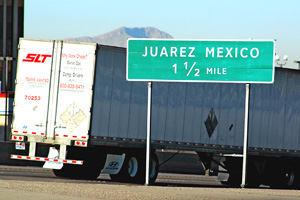Court Denies Teamsters, OOIDA Bids to Stop Cross-Border Mexican Truck Program

A federal appeals court Friday denied attempts from two truck drivers’ organizations that had sought to stop the Federal Motor Carrier Safety Administration’s pilot program that allows Mexico-based companies to operate in the interior of the United States.
The U.S. Court of Appeals for the District of Columbia Circuit rejected all of the arguments made by the Owner-Operator Independent Drivers Association and the Teamsters union, saying that the program complies with all applicable laws and can proceed.
After being suspended when the Obama administration took office, the cross-border pilot program was relaunched in October 2011 to comply with a provision in Nafta and to stop $2.4 billion in annual retaliatory tariffs Mexico imposed on U.S. goods. The program is scheduled to last three years.
FMCSA spokesman Duane DeBruyne said the decision found “that we apply the same rigorous safety standards under the program that we require of all U.S. carriers.”
“We remain committed to the success of the pilot program and will continue to work with everyone involved to ensure it is carried out safely,” he said.
OOIDA’s argument centered around the fact that FMCSA is allowing Mexican truck drivers to use Mexican commercial licenses, Mexican medical certification and Mexico-based drug testing centers. U.S. law requires American licenses, medical certification and drug testing, the group said.
The court disagreed in all three instances, saying Congress has allowed the Mexican equivalents for participation in the program, and that FMCSA correctly listened. It also said that the program allows Mexican truck drivers to use their Mexico-issued commercial driver licenses.
OOIDA said following the ruling that it was “disappointed” in the court’s conclusion.
“OOIDA laid out careful, detailed arguments describing how Mexican laws do not meet U.S. safety standards and how the pilot program permits Mexican truckers not to comply with U.S. laws,” spokeswoman Norita Taylor said on behalf of the group’s lawyers.
While the court said the groups had legal standing to file the suit challenging the pilot program, it wrote that Congress had “balanced a variety of interests, including safety, American truckers’ well-being, foreign trade and foreign relations.”
In the Teamsters’ lawsuit, which the court treated separately, the union argued that Mexican trucks in the program should be subject to regulations for imported vehicles, that Mexico’s vision tests for truck drivers are not comparable to the U.S. tests and that FMCSA improperly skipped the process of evaluating how the program would affect the environment, among other objections.
The federal judges treated the Teamsters’ arguments similarly to those of OOIDA and denied all of them.

